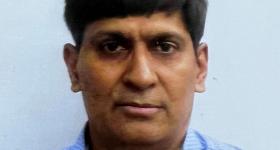Pilot Award Recipient: Seshagiri Rao Nandula, PhD
Seshagiri Rao Nandula, PhD has received a pilot award to study the effect of HIV medications on cardiometabolic health in African American Veterans.

The DC CFAR funds a wide array of HIV investigators in basic, clinical, and socio-behavioral science. The most recent awardees are listed below
View the archive to learn more about awards given in 2017 or earlier.

Pilot Award Recipient: Seshagiri Rao Nandula, PhD
Seshagiri Rao Nandula, PhD has received a pilot award to study the effect of HIV medications on cardiometabolic health in African American Veterans.
Pilot Award Recipient: Michael Anthony Thomas, PhD
Despite significant advancements made in treatment, in 2021 about 650 thousand people died from HIV related causes.

Pilot Award Recipient: Derek Dangerfield II, PhD
PrEP initiation must be substantially improved among young Black sexual minority men (SMM) to meet the goals of the Ending the HIV Epidemic (EHE) Plan for 2030.

Pilot Award Recipient: Kellan Baker, PhD, MPH, MA
The proposed study will use quantitative data from EMR chart review and qualitative data from semistructured interviews to assess evidence for health care delivery models that leverage...

Pilot Award Recipient: Lee Campbell, PhD
The current opioid epidemic has seen the rise of fentanyl among people who inject drugs (PWID) and has led to unprecedented challenges in the management and recovery of these individuals.

Pilot Award Recipient: Georges Haddad, PhD
The pandemic of the Acquired Immunodeficiency Syndrome due to the lentiviral retrovirus, Human Immunodeficiency Virus Type 1 (HIV-1) is still affecting millions of people.

Pilot Award Recipient: Donaldson Conserve, MS, PhD
Community-based confirmatory HIV testing to support ART initiation can address the current gaps for HIVST.

Pilot Award Recipient: Alexander Zestos, PhD
While a number of drugs are used intravenously in people living with HIV, one group of drugs receiving increasing attention are the opiates as opiate users nearly tripled from 2009-2016.

Pilot Award Recipient: Mark Laubach, PhD
This project will investigate how toxins produced by HIV1 and antiretroviral therapies used to treat HIV impact the frontal cortex.

Pilot Award Recipient: Yan Wang, DrPH, MD
Globally, female sex workers (FSW) are disproportionately affected by HIV compared to adult women overall.
